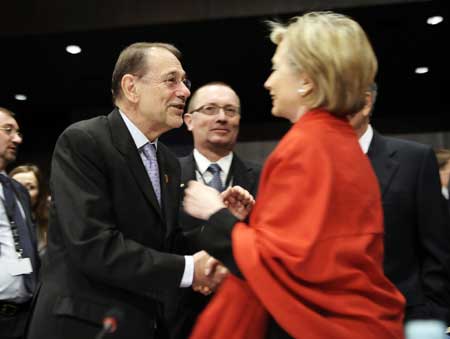As U.S. Secretary of State Hillary Clinton kicked off on Monday evening a 36-hour trip in Israel and the Palestinian territories, she would feel the full weight of a seemingly-intractable, 60-year conflict resting on her shoulders.
 |
|
U.S. Secretary of State Hillary Clinton (R) shakes hands with European Union foreign policy chief Javier Solana during the international donors' conference to plan the reconstruction of the Palestinian Gaza Strip, in Sharm El-Sheikh of Egypt, March 2, 2009. Officials and representatives from more than 70 countries and some 15 organizations attended the conference kicked off Monday morning. [Xinhua] |
For decades, American diplomats have taken the lead in trying to resolve the Israeli-Palestinian conflict -- a task neither have been relinquished nor have completed.
"Time is of the essence," Clinton said on the eve of her arrival in Israel. "We cannot afford more setbacks and delays, or regrets about what might have been had different decisions been made. And now is not the time for recriminations. It is time to look ahead."
She made the comments on Monday in the Egyptian resort town Sharm el-Sheikh, where she was the star attraction at a meeting of some 70 donor nations that together pledged in excess of 4.4 billion U.S. dollars to help reconstruct the war-battered Gaza Strip.
With January's fighting in Gaza in mind, Clinton starts to pick up the pieces of the so-called Middle East peace process. Even before the fighting erupted, Israeli-Palestinian negotiations were faltering.
The Palestinian National Authority (PNA), which the international community recognizes as the official Palestinian government, all but broke off talks with Israel, saying the Jewish state was not serious about peace.
Palestinian President Mahmoud Abbas welcomed the generosity of the donors, but stressed talking with the Israelis in order to achieve a final settlement is the goal.
Clinton has to deal with two major issues at the beginning.
First is the matter of the establishment of a new Israeli government that wants to adopt the Annapolis formula, which is the current basis for the peace process.
In February's general election in Israel, the hawkish Likud leader, former Prime Minister Benjamin Netanyahu is only the second-largest party in the Knesset (parliament). Israeli President Shimon Peres has charged Netanyahu with forming the next government.
Kadima, the largest party led by Israeli Foreign Minister Tzipi Livni, is so far refusing to join a Likud-led coalition, and that is forcing Netanyahu towards the creation of a narrow right-wing government.
Kadima maintains that a Netanyahu-led government will shun the peace process and reject the progress made since the Annapolis peace conference, which was held in the U.S. in late 2007.
Netanyahu reportedly offered Kadima parity in the cabinet and in forming the policies of the new government, but senior Kadima politician Haim Ramon told Israel's Army Radio that there was one thing Netanyahu would not agree to: "two states for two peoples."
Indeed, the manifestoes of several Netanyahu's natural partners in government utterly rejected the idea of territorial compromise - - something that is a basic principle of the Annapolis conference.
Even if Netanyahu creates a government that manages to overcome this hurdle and adopts a pro-negotiation stance, Clinton will still have to deal with the political crisis on the Palestinian side.
For Clinton, the second major issue to be dealt with is the rebuilding of trust between Israel and the Palestinians, something that was shattered with the 22-day-old Israeli Cast Lead Operation in Gaza.
Israel mush show "the Palestinians that there are benefits to negotiate if their goal is to control their own destiny and live in peace and dignity in an economically viable state," Clinton said in Sharm el-Sheikh on Monday.
"For the Palestinians, it means that it is time to break the cycle of rejection and resistance, to cut the strings pulled by those who exploit the suffering of innocent people, and show the world what the talent and skills of an exceptional people can build and create," said the U.S. top diplomat.
Clinton, whose first visit to the region in her new job, will be largely a listening exercise, knows that it is highly unlikely the U.S. alone will manage to broker a lasting Israeli-Palestinian peace deal.
Indeed, many regional analysts remain skeptical that the International Quartet, which comprises the United States, Russia, the United Nations and European Union, is capable of persuading Israelis and Palestinians to put aside old hatreds and forge a new path.
However, taking in what both Palestinians and Israelis have to say, the former first lady will let Israel and the PNA know that she is someone to be reckoned with and will stamp her own style on the peace process.
(Xinhua News Agency March 3, 2009)